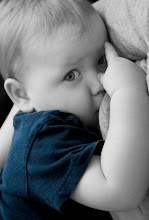
Photo: CORBIS
Breastfeeding: the miracle of mother's milk
Whatever the studies say, breast is still best, says Victoria Lambert.
By Victoria Lambert
Published: 7:00AM GMT 22 Jan 2010
Breastfeeding is the cheapest, cleanest and healthiest way to nurture a baby
We've all known mothers who can whip out a breast, whip on a baby, and lactate like mad – without effort, embarrassment or, in some cases, embonpoint. For me, breastfeeding was a slog: six months of broken nights, screaming and tears (mine, mostly). But I don't regret a moment.
Breastfeeding – if you can – is the cheapest, cleanest and healthiest way to nurture a baby. That's not just my opinion or that of the World Health Organisation (which recommends breastfeeding for the first six months) – it's common sense, isn't it?
Perhaps, but Breast v Bottle is still one of the most furious debates in modern mothering, fuelled by powerful hormones on one hand, and the billion-pound formula industry on the other. This month, the fire has been fed by two scientific studies suggesting that breastfeeding might not be worth the bother – let alone the guilt and distress if you can't or choose not to.
In the first, Prof Sven Carlsen, from the Norwegian University of Science and Technology in Trondheim, reviewed more than 50 studies into the relationship between health and breastfeeding. Most concluded that the longer a child was nursed, the healthier it would be. He attributed this, however, to a healthier pregnancy, not breast milk, claiming "baby formula is as good as breast milk".
This week, the second study, from Southampton University found that breastfeeding does not make babies more intelligent. It noted that breastfed infants tended to be brighter simply because their mothers were (and brighter women are more likely to breastfeed). So lactation doesn't make our loved ones brainier or healthier? Can we break out the bottles and book a long night's pain-free sleep then?
Not so fast. For every study that concludes that breast milk is on a par with formula, twice as many conclude it is liquid gold. They find it protects against stomach bugs, and wards off asthma and chest infections. Mothers who breastfeed lower their risk of breast and ovarian cancers, and shed baby weight more easily.
And as every scientist knows, there are different classes of study – some are tiny; some may appear in little-known journals that other professionals do not rate seriously; and some are paid for by organisations that have their own point to prove, such as formula manufacturers.
Formula milk is big business. In Britain, Save the Children reckons that for every £1 spent in 2006-7 on breastfeeding promotion, £10 was spent by manufacturers on advertising and promotion. The market leader, Nestlé, has been subject, off and on, to a worldwide boycott for more than 30 years because of the way it is seen to target mothers in countries where formula feed can be expensive and dangerous to use.
It can be argued that Prof Carlsen's investigation doesn't stand up to scrutiny, although it was funded by the central Norway regional health authority and published in the peer-reviewed, although not well-known, journal Acta Obstetricia et Gynecologica Scandinavica.
And the news that breast milk doesn't boost brainpower can be contradicted by other studies that have found the reverse: a 2001 study concluded that children who were breastfed for fewer than three months were more likely to score below average for mental skills at 13 months, and have lower IQ levels at five years, than those who were breastfed for six months or more.
It is difficult to master science at the best of times – let alone in the fog of exhaustion and hormones caused by giving birth. Had anyone presented me with a research paper three days postpartum, I'd have found a use for it – but not one connected to what went into my child.
The most important boon of lactation cannot be analysed or peer-reviewed. It's something our ancestors knew instinctively: breastfeeding is a chance for mother and baby to connect physically and emotionally. And for mum to put her feet up.

1 comment:
Obat Aborsi | Jual Obat Aborsi
Obat Aborsi Usia 1 Bulan | Obat Aborsi Usia 2 Bulan
Obat Aborsi Usia 3 Bulan | Obat Aborsi Usia 4 Bulan
Post a Comment